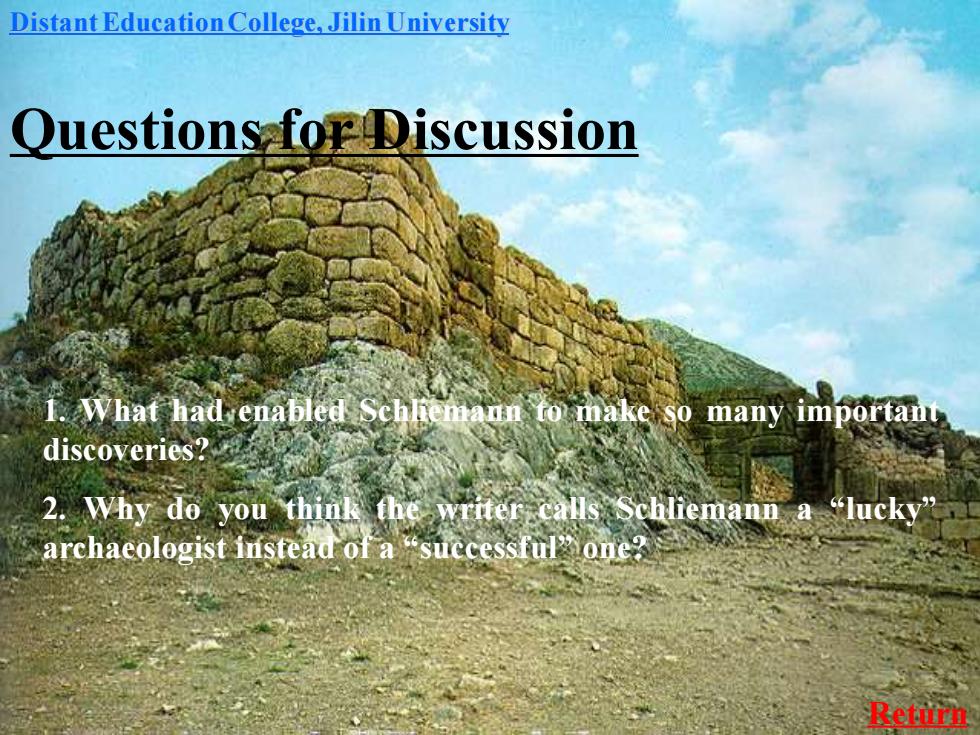
Distant Education College,Jilin University Lesson 4 The Lucky Archaeolopis r.Backtttead denoiledse TertAnis Exercies Questions Fon Discussion
Lesson 4 The Lucky Archaeologist 1. Background Knowledge 2. Text Analysis 3. Exercises 4. Questions For Discussion Distant Education College, Jilin University Extensive Reading III

Distant Education College,Jilin University Background Knowledge 1.Heinrich Schliemann [5halnrik 5Fli:mEn](1822-1890): Born in Germany in 1822,Heinrich Schliemann was the son of a poor pastor.When he was seven years old,a picture of Troy in flames impressed him deeply and he took it as the absolute truth that Troy had existed.At the age of 14,he worked in a grocery store,but gave up this job because of ill health.Then he became a cabin boy.On his way to South America his ship was wrecked and he was left in the Netherlands,where he found work in business. More
Background Knowledge Distant Education College, Jilin University 1. Heinrich Schliemann [5haInrik 5Fli:mEn] (1822-1890): Born in Germany in 1822, Heinrich Schliemann was the son of a poor pastor. When he was seven years old, a picture of Troy in flames impressed him deeply and he took it as the absolute truth that Troy had existed. At the age of 14, he worked in a grocery store, but gave up this job because of ill health. Then he became a cabin boy. On his way to South America his ship was wrecked and he was left in the Netherlands, where he found work in business. More

Distant Education College,Jilin University Background Knowledge In a very short time he mastered 13 major European languages, including both ancient and modern Greek.In 1846,Schliemann went to St.Petersburg,Russia,where he worked hard and amassed a large fortune.At the age of 41,he retired and traveled extensively,especially in Greece.After studying archaeology in Paris,Schliemann moved to Greece and started his excavation of Troy in 1868.His discoveries in Turkey and Greece made him a symbol of the romance and excitement of archaeology. More
Background Knowledge Distant Education College, Jilin University In a very short time he mastered 13 major European languages, including both ancient and modern Greek. In 1846, Schliemann went to St. Petersburg, Russia, where he worked hard and amassed a large fortune. At the age of 41, he retired and traveled extensively, especially in Greece. After studying archaeology in Paris, Schliemann moved to Greece and started his excavation of Troy in 1868. His discoveries in Turkey and Greece made him a symbol of the romance and excitement of archaeology. More

Distant Education College,Jilin University Background Knowledge 2.Homer [5hEumE]:Tradition tells us that Homer was an ancient Greek poet in what is now the western coast of Turkey.His two epic poems,the Iliad and the Odyssey,are considered the greatest works of art of ancient Greece and among the greatest treasures of Western literature.Almost nothing is known about Homer,but his poems suggest that he lived in the last half of the 8th century BC. Some scholars even deny that "Homer"ever existed. Return
Background Knowledge Distant Education College, Jilin University 2. Homer [5hEumE] : Tradition tells us that Homer was an ancient Greek poet in what is now the western coast of Turkey. His two epic poems, the Iliad and the Odyssey, are considered the greatest works of art of ancient Greece and among the greatest treasures of Western literature. Almost nothing is known about Homer, but his poems suggest that he lived in the last half of the 8th century BC. Some scholars even deny that “Homer” ever existed. Return

Distant Education College,Jilin University Questions for Discussion 1.What had enabled Schhemaon to make so many important discoveries? 2.Why do you think the writer calls Schliemann a“lucky” archaeologist instead of a"successful one? Return
Questions for Discussion Distant Education College, Jilin University 1. What had enabled Schliemann to make so many important discoveries? 2. Why do you think the writer calls Schliemann a “lucky” archaeologist instead of a “successful” one? Return